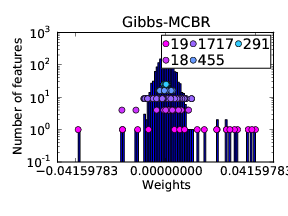Section:
New Results
Multiclass Sparse Bayesian Regression for fMRI-Based Prediction
Inverse inference has recently become a popular approach for
analyzing neuroimaging data, by quantifying the amount of information
contained in brain images on perceptual, cognitive, and behavioral
parameters. As it outlines brain regions that convey information for
an accurate prediction of the parameter of interest, it allows to
understand how the corresponding information is encoded in the
brain. However, it relies on a prediction function that is plagued by
the curse of dimensionality, as there are far more features (voxels)
than samples (images), and dimension reduction is thus a mandatory
step. We introduce in this work a new model, called Multiclass
Sparse Bayesian Regression (MCBR), that, unlike classical
alternatives, automatically adapts the amount of regularization to
the available data. MCBR consists in grouping features into several
classes and then regularizing each class differently in order to
apply an adaptive and efficient regularization. We detail these
framework and validate our algorithm on simulated and real
neuroimaging data sets, showing that it performs better than
reference methods while yielding interpretable clusters of features.
See also [13] and Fig. 2 .
Figure
2. Mental representation of size - Inter-subject
analysis. Histogram of the weights found by Gibbs-MCBR,
and corresponding class membership values (each color of dots
represents a different class), for the inter-subject analyzes on the
mental representation of size. We can see that
Gibbs-MCBR creates clusters of informative and non
informative voxels, and that the different classes are regularized
differently, according to the relevance of the features within
them. |



